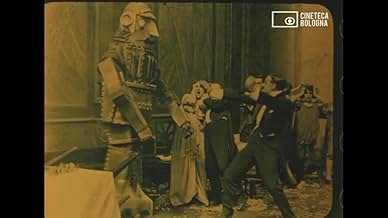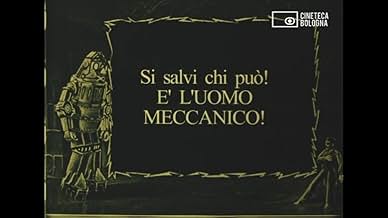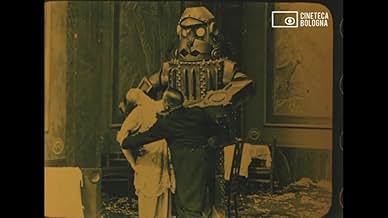The story begins with a scientist creating a device shaped like a man that can be remote-controlled by a machine.The story begins with a scientist creating a device shaped like a man that can be remote-controlled by a machine.The story begins with a scientist creating a device shaped like a man that can be remote-controlled by a machine.
- Director
- Writer
- All cast & crew
- Production, box office & more at IMDbPro
Storyline
Did you know
- TriviaFor many years this early science-fiction film from Italy was thought to be lost. Some reels of the Portuguese release version were discovered in Brazil. This amounted to 740 meters, which is believed to be approximately 40% of the complete film. Luckily, the discovered footage came from the later part of the film and included some of the special effects and the battle of the two robots in the Opera House. As of mid-2006 this is the only footage known to survive.
- ConnectionsFeatured in More Human Than Human (2018)
Featured review
André Deed was a pioneer comic star who made films in both France and Italy (originally as Boireau/Cretinetti) and whose career paved the way for all the comic stars who came after. His reputation has always suffered particularly amongst anglophone critics from the usual tendency to try and read history backwards and portray the earlier comic stars as simply primitive versions of Charlie Chaplin. So amongst the English critics, on the basis usually of very little acquaintance with the actual films, he has always passed for nothing but an eyeball-rolling, face-pulling farceur and one sees the sad evidence of that oft-repeated caricature in some of the review here.
In fact, even if Deed's comic style was broad, his films often contain very interesting elements of the surreal that is part of a Franco-Italian tradition quite different from the later US comics )even Keaton, whose surrealism is of a rather different kind). In the later part of his career he himself acted less and less, preferring to concentrate on directing and writing and promoting the career of his wife Valeria Frascaroli, who is splendid as the masked villainess in this film.
It is a great shame that this film does not survive in a fuller and more continuous form because it introduces some very good ideas. It is not by any means the first appearance in films of automata (the word "robot" had yet to be coined) or mechanical men (the Houdini serial Man of Mystery of the previous year features a very similar automaton) but it is notable in presenting the robot in more believable science-fiction manner (the Houdini automaton turns out to be a fake), particularly by introducing the notion of "remote control". It also plays very nicely on the idea of the automaton - by having the automaton pass as a guest at a fancy dress ball and by having two rival automata fighting it out.
Stylistically Deed follows Feuillade quite closely and could not have had a better model. All in all it is an important early piece of science fiction that deserves considerable respect. I believe my description of Deed in the summary is a more accurate one than usually sees.
In fact, even if Deed's comic style was broad, his films often contain very interesting elements of the surreal that is part of a Franco-Italian tradition quite different from the later US comics )even Keaton, whose surrealism is of a rather different kind). In the later part of his career he himself acted less and less, preferring to concentrate on directing and writing and promoting the career of his wife Valeria Frascaroli, who is splendid as the masked villainess in this film.
It is a great shame that this film does not survive in a fuller and more continuous form because it introduces some very good ideas. It is not by any means the first appearance in films of automata (the word "robot" had yet to be coined) or mechanical men (the Houdini serial Man of Mystery of the previous year features a very similar automaton) but it is notable in presenting the robot in more believable science-fiction manner (the Houdini automaton turns out to be a fake), particularly by introducing the notion of "remote control". It also plays very nicely on the idea of the automaton - by having the automaton pass as a guest at a fancy dress ball and by having two rival automata fighting it out.
Stylistically Deed follows Feuillade quite closely and could not have had a better model. All in all it is an important early piece of science fiction that deserves considerable respect. I believe my description of Deed in the summary is a more accurate one than usually sees.
Details
- Release date
- Country of origin
- Language
- Also known as
- Mehanički čovek
- Production company
- See more company credits at IMDbPro
- Runtime26 minutes
- Color
- Sound mix
- Aspect ratio
- 1.33 : 1
Contribute to this page
Suggest an edit or add missing content




















